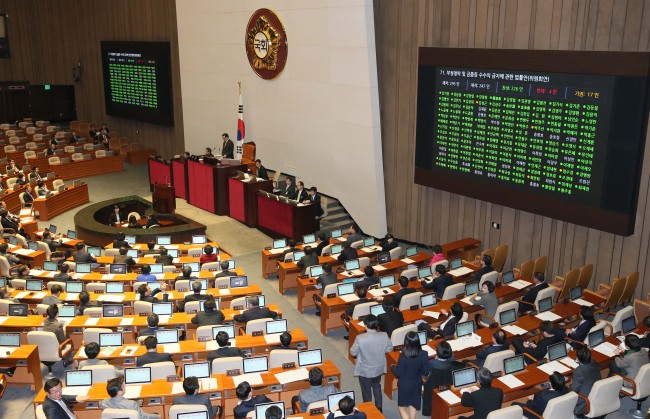The National Assembly on Tuesday passed a controversial anti-corruption bill following months of wrangling over whether it violates an individual's constitutional rights, among other issues.
The so-called Kim Young-ran Law, named after the former Anti-Corruption and Civil Rights Commission chief who proposed the legislation in June 2011, passed through a plenary session by 226-4 with 17 abstentions on the last day of February's extra parliamentary session.
The new law subjects public officials, journalists and private school faculty to a maximum penalty of three years in prison or five times the amount they accepted in money or valuables if they take money or valuables worth more than 1 million won ($908) from one person in one installment, regardless of whether it was in exchange for favors or related to their work.

For gifts that are work-related and worth 1 million won or less, the penalty is a fine of up to five times the gift's value.
"We respect the decision of the National Assembly," presidential spokesman Min Kyung-wook told reporters shortly after Air Force One touched down in Riyadh.
He also said he expects the law to help root out corruption in a country that has a track record of cozy relationships between politicians and businessmen.
Min is accompanying President Park Geun-hye, who is visiting Saudi Arabia, the second stop on her four-nation swing that will take her from Kuwait to the United Arab Emirates and Qatar.
Passage of the bill had been delayed amid wrangling over its details, including a clause that requires public officials to report a family member's acceptance of a bribe.
Critics argued that the clause infringes on the constitutionally-guaranteed freedom of conscience and destroys family relationships.
On Monday, the ruling Saenuri Party and main opposition New Politics Alliance for Democracy agreed to keep that clause but limit the scope of another clause to apply the law only to public officials and their spouses, not their other family members.
The official, not the spouse, would be subject to the relevant punishment.
The parties also agreed to allow an 18-month grace period for enforcement of the law from the date of its proclamation.
The bill was drawn up to tighten loopholes in existing anti-corruption rules under which public officials cannot be punished for accepting expensive gifts and services unless there is evidence of reciprocity.
Hailing the law's passage, civic groups expressed hopes that it will serve as an opportunity to sever the chain of corruption in the Korean society and make the country more transparent.
Speaking during a party meeting earlier in the day, NPAD Chairman Moon Jae-in said the new law's removal of the distinction between work-related and unrelated gifts is a "big achievement."
South Korea has climbed three notches in an international corruption awareness ranking to 43rd out of 175 countries in 2014, according to a global anti-corruption watchdog.
The Berlin-based Transparency International said in December that South Korea scored 55 out of 100 in its 2014 Corruption Perceptions Index, with high scores meaning low corruption.
Also Tuesday, the parliament voted down a bill that requires child care centers to install surveillance cameras in a 83-42 vote with 46 blank ballots. The bill was proposed after the disclosure of video footage of a 33-year old female teacher striking a 4-year-old girl and ordering her to finish her leftovers at a day care center in Incheon in January, which caused widespread public outrage. (Yonhap)







![[Graphic News] More Koreans say they plan long-distance trips this year](http://res.heraldm.com/phpwas/restmb_idxmake.php?idx=644&simg=/content/image/2024/04/17/20240417050828_0.gif&u=)
![[KH Explains] Hyundai's full hybrid edge to pay off amid slow transition to pure EVs](http://res.heraldm.com/phpwas/restmb_idxmake.php?idx=644&simg=/content/image/2024/04/18/20240418050645_0.jpg&u=20240419100350)





![[From the Scene] Monks, Buddhists hail return of remains of Buddhas](http://res.heraldm.com/phpwas/restmb_idxmake.php?idx=652&simg=/content/image/2024/04/19/20240419050617_0.jpg&u=20240419175937)

![[KH Explains] Hyundai's full hybrid edge to pay off amid slow transition to pure EVs](http://res.heraldm.com/phpwas/restmb_idxmake.php?idx=652&simg=/content/image/2024/04/18/20240418050645_0.jpg&u=20240419100350)

![[Today’s K-pop] Illit drops debut single remix](http://res.heraldm.com/phpwas/restmb_idxmake.php?idx=642&simg=/content/image/2024/04/19/20240419050612_0.jpg&u=)